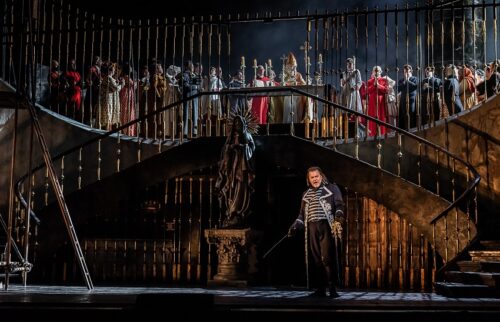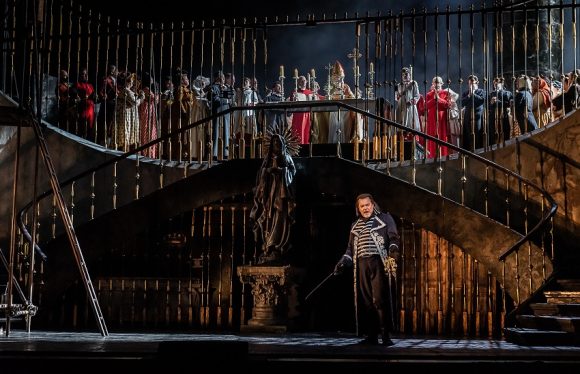 United Kingdom Puccini, Tosca: Soloists, Royal Opera House Chorus and Orchestra / Marco Armiliato (conductor). Royal Opera House, Covent Garden, London. 8.2.2022. (JPr)
United Kingdom Puccini, Tosca: Soloists, Royal Opera House Chorus and Orchestra / Marco Armiliato (conductor). Royal Opera House, Covent Garden, London. 8.2.2022. (JPr)

Production:
Director – Jonathan Kent
Revival Director – Lucy Bradley
Designer – Paul Brown
Lighting designer – Mark Henderson
Chorus director – William Spaulding
Cast:
Floria Tosca – Angela Gheorghiu
Mario Cavaradossi – Stefan Pop
Baron Scarpia – Michael Volle
Angelotti – Chuma Sijeqa
Spoletta – Aled Hall
Sacristan – Alexander Köpeczi
Sciarrone – Simon Wilding
Gaoler – John Morrissey
Shepherd boy – Alfie Davis
Perhaps because this was my first live opera of 2022 after an extended musical break at Christmas and with my critical faculties – for what they are worth – somewhat refreshed, I found myself enormously enjoying this opening night of the final performances of an extended tenth revival of Jonathan Kent’s 2006 Tosca production. I have seen Puccini’s ‘shabby little shocker’ so many times and almost as many times might have written how a great performance of Tosca is a visceral experience and should take you on an emotional rollercoaster ride which makes you realise how Puccini never wasted a note. I suggest my eyes did not moisten during ‘Vissi d’arte’ – sung by Angela Gheorghiu with her signature autobiographical fervour – only because with our current #MeToo sensibilities I was willing Tosca not to succumb to unwanted sexual attention from such a powerful authority figure, Baron Scarpia, in order to save her lover from execution. I know how the second act ends yet still wanted her to fight back.
Thus Puccini’s tale of an operatic diva, the political free-thinker painter Cavaradossi and a sadistic chief of police all caught up in a net of love and revolution still seems a very modern one. I have written before how if you add into this mix the torture scene and an attempted rape that Scarpia enjoys too much; the horrendous choice Tosca faces and the disgust and hatred she expresses of him; a murder and a death by firing squad, as well as two suicides, the final one being Tosca herself, it has all the violence of a twenty-first century hit film even if it was a surprising choice of subject for Puccini in 1900.
Lucy Bradley did a superb job in bringing Kent’s original staging to life though I get the impression nobody will ever love it simply because it isn’t Franco Zeffirelli’s much-revered 1964 one – remembered from the filmed performance with Maria Callas and Tito Gobbi – which it replaced. Paul Brown’s sets are ultratraditional, detailed and three-dimensional, his costumes are also of the period the opera is set in and it provides everything needed for Tosca. There are the three major locations from the Rome of Napoleonic times; the church of Sant’Andrea della Valle with its double staircase, Scarpia’s Palazzo Farnese apartment lined with mostly empty bookshelves and the desolate moonlit scene for the execution on the ramparts of Castel Sant’Angelo. Mark Henderson’s lighting generally seemed even more dingy than usual at times bringing a suitably cinematic feel to what we are seeing, though the principal singers remain conspicuously spotlighted throughout. Everything combines to allow the well-known tale to unfold unhindered by directorial whim. My only possible criticism of the production has been – and still is – that everything is mostly restricted to just the front third of the stage though I suspect the triumvirate of singers in the leading roles in this revival would not have it any other way.
I first saw Angela Gheorghiu triumph when singing her first Violetta in 1994 under the baton of Sir Georg Solti on the opening night of Sir Richard Eyre’s (now over-familiar) La traviata which has been revived umpteen times and will be back soon at Covent Garden. This was a couple of years after her debut with The Royal Opera, so 2022 is her thirtieth anniversary in London. Of course her voice now is not what it was all those years ago – and recently it seems to take a little time to warm up – but she remains a soprano at the height of her powers. And Tosca is a role she can bring to dramatic life because Gheorghiu knows precisely who Tosca is! (Gheorghiu as Tosca as Gheorghiu?) I suspect she brings her own affecting touches to the character, just watch her gesture to her own dark eyes during her anger over the blue-eyed blonde Cavaradossi has painted (‘Ma falle gli occhi neri!’/ ‘But let her eyes be black ones!’). Gheorghiu is alternately pious, playful, flirtatious, jealous, volcanically angry, vengeful, fearful and full of anguish. The way her Tosca strove to fend off Scarpia’s oleaginous advances in Act II was gripping, her somewhat internalised ‘Vissi d’arte’ stopped the show, and not forgetting how heart-wrenching it was to witness how totally oblivious she is about her lover’s ‘fake’ execution though I suspect Cavaradossi knows he is doomed die.
Cavaradossi was sung by Gheorghiu’s Romanian compatriot Stefan Pop, he looks a lot like a young Luciano Pavarotti, proved himself to be a (similarly) convincing actor with an easy-going manner on stage. Unlike the legendary Italian tenor, Pop’s voice has Wagnerian heft and he began by believing he was singing at Verona. ‘Recondita armonia’ was robust and lacked a little elegance but he pared his sound back for a plaintive and deeply moving ‘E lucevan le stelle’. He would be welcome back to Covent Garden anytime.

Michael Volle is a baritone who can seemingly sing everything from Don Giovanni to Hans Sachs. There can be few better Scarpias today and I was totally convinced that he could be so unscrupulous to go to any lengths to torture the information he needed from someone, as well as finding too much pleasure in forcing himself on any woman to get what he wants from them (‘Ha più for te sapore la conquista violenta’/’For myself the violent conquest has stronger relish than the soft surrender’). His sparring match with Tosca – which doesn’t end well for him of course – was as gripping as it was exciting to listen to. Volle’s ‘Ebbene?’ (‘Well?’) before Tosca nods her compliance was chilling.
In the smaller roles, the third Romanian in the cast Alexander Köpeczi was a more youthful than usual Sacristan, showed good comic timing and had a bass voice worthy of bigger roles. Jette Parker Anniversary Company Artist Chuma Sijeqa impressed as the desperately fleeing Angelotti; Aled Hall is an experienced Spoletta, ruthlessly efficient and very eager to please Scarpia; Simon Wilding did the best with the little Puccini gives him as the other henchman Sciarrone; and Alfie Davis was a suitably piping shepherd boy.
Only James Levine has conducted more performances than Marco Armiliato at the New York Metropolitan Opera in recent decades. Could he be another lining up to replace Antonio Pappano as music director at Covent Garden since Armiliato has conducted – to much acclaim – a wide operatic repertoire throughout the world. He certainly brought out the best in all concerned from the opening demonic chords to the declamatory reprise of ‘E lucevan le stelle’ as Tosca jumps to her death thus celebrating her love for Cavaradossi. William Spaulding’s chorus (with the addition of some enthusiastic children from The Cardinal Vaughan Memorial School) filled the stage with sound in the first act’s Te Deum.
Jim Pritchard
